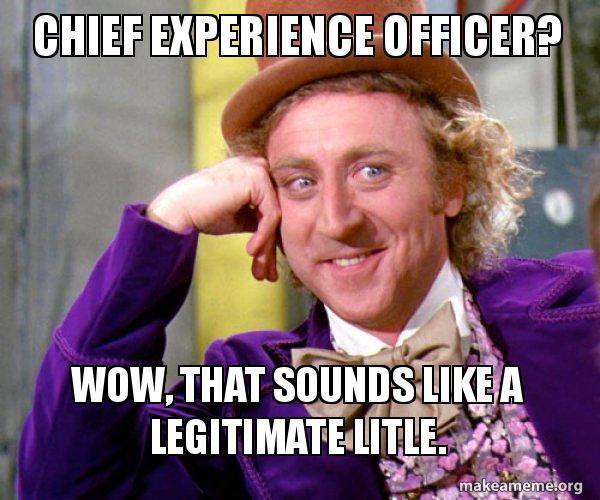Strategy is just advanced common sense
Several years back I was being interviewed at a large agency for a job as a digital cultural anthropologist.
At the time I didn’t have a clue what the title meant, and since apparently neither did they, I became the leading candidate, and hired me.
As is typical in large, lumbering agencies, appearance trumps substance.
I was all in… I imagined handing out my business card with “Digital Cultural Anthropologist” at parties… and watching them being impressed with such a magnamious and important sounding title.

When work started I decided to take the first week and define what a digital cultural anthropologist did in the hopes of providing everyone - especially myself - with a reason why they hired me. And in typical agency fashion I thought it might be a good idea to present my thoughts with the entire agency over free pizza.
You should know that in planning department of ad agencies, strategies live as stories. And in agencies those stories find life as Powerpoint decks. Usually they get presented at lunch and learns over free pizza.
After a bit of old fashioned Interweb research, I landed on the idea that a digital cultural anthropologist’s main purpose would be to look to the collective intelligence of humanity using Internet tools (think Google trends, Twitter, etc) as a means to gain insight for communications planning purposes.
I presented my story to the agency and I think a few of the people paying attention actually liked it.
So the first week turned out well. I had defined a path forward. I set the parameters of what I was there to do, the types of deliverables I’d create, the amazing insights I’d help generate, and how we’d roll this all out.
In short, I created a plan for what I was to do. This plan then formed the basis for my daily life at the agency. And my audience got to get free pizza. Win win.
Being a strategist sounds impressive, and perhaps in some ways it is, but building a strategy certainly isn’t complex.
Strategy - and marketing or digital strategy in particular - is at it’s core just advanced common sense.
We all “do” strategy every day.
At the most basic level, strategy is the process of forethought as to how we will accomplish an objective of our own imagination.
Imagine you’re going on a date tomorrow.
A poor strategic thinker might miss out on the fact it’s scheduled to rain, then at the appointed time go out & get soaked, be late to dinner, and make an overall general mess of themselves.
But if we were to think a little more strategically ahead of time, we might imagine in our mind’s eye what we want to happen, then a day before we’d look up the weather for the next day and see that there was a high chance of rain. So we’d bring an umbrella. We might look up the restaurant online, and plan what we’d order in advance. We’d be so buttoned up and on point, our date couldn’t help to be impressed.
And so good strategic thinking - whether for a date, or for marketing purposes - reduces inefficiency, and maximizes our chances of hitting our desired outcomes.
To build a strategy all one needs is the ability to set a measurable goal, and then have the ability to imagine future potential scenarios to achieve it.
And since most of us buy things, it’s not so difficult to imagine what might be appealing to a potential prospect or customer. Which is why building a marketing strategy is at it’s core pretty easy.
One summer when I was working at another agency in NYC, I had the pleasure to work with an intern from Oxford who was getting his PhD in theoretical physics.
Needless to say, I learned more from him that summer than he did from me!
One of the first things I asked him was what the heck he was doing here, when he could be busy solving quantum mechanics and generally divining the secrets of the universe.
His response: “Theres nothing harder than changing human behavior, and even harder than that is changing behavior on a mass scale”
A great point indeed. And one that I realized was quite true.
Strategy is easy inasmuch as it’s just the process of forethought, and that it’s part of our nature as thinking beings.
But a strategy also gets executed, and it needs to change people’s behavior on a mass scale which is difficult.
Mostly as marketers we want to get lots of people to buy our product or service.
We do things like build brand awareness, or direct response, or content marketing, but it’s all really serving the same master.
To make matters worse, our audience is innundated by all sorts of other marketing messages, and of course they’re just living their lives and so the last thing on their mind is what YOU want.
The other challenge is that the herd of digital marketers and ninja types all tend to congregate around doing things the same way, following the latest trends, building funnels, creating content and the like - and so they drink the same Kool-Aid which ironically contributes to the difficulty of their brands in fact standing out.
But…
- If we can break free from marketing jargon…
- And ignore what all the “gurus” online are saying…
- And we can understand your target… not as a 2 dimensional persona but as a multi-dimensional complex individual…
- And we have some experience under our belt to see patterns of things that work and thing that don’t…
In short, if we can think more insightfully about our business challenges & target audience than others, we just might just have a shot building a strategy that will not only be actionable, but that can change behavior on a mass scale, and in so doing enrich both ourselves, our target, and our clients.
And when we can do that, we literally have the power to create from nothing a reality of our own making, that can change people’s lives.
And that is, at it’s highest level I think, is what great strategy can do.
Strategy can be more than just an item that we check off our task list because it’s what we should do.
Like Neo in the Matrix, a good strategist will - through their power of forethought, storytelling, and excellent Powerpoint deck creation - in strategic execution bend future reality to their will.

Neo, the master strategist, bending future outcomes to his will.
And that my friend, is why creating strategy is both incredibly easy, and incredibly hard to do well, all at the same time.
